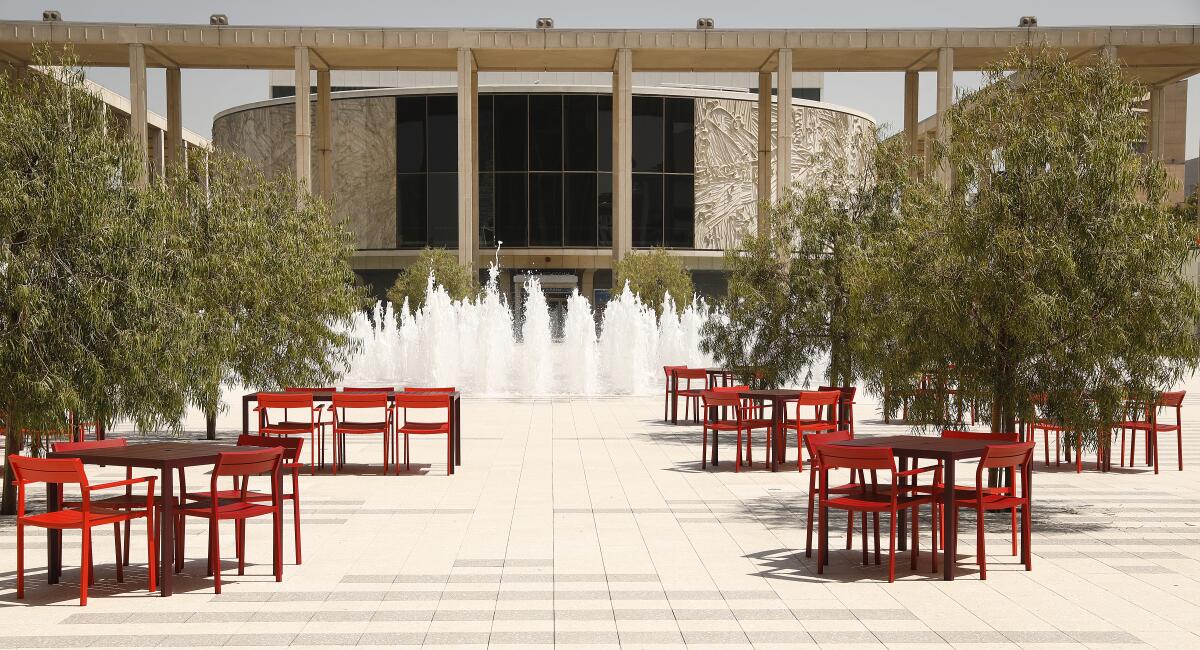Sure, resolve to stage more plays by women. It still won’t make up for all we’ve lost

- Share via
Recently a producer revealed he had held one of my plays for years without reading it. And then the punchline: What he’d always liked about me, he said, was that despite being repeatedly disrespected and pushed aside, “Sarah, you took it like a man.”
It was one of those typical female playwright moments when, despite everything you’ve been through, you still can’t believe that the people with the power have the chutzpah to talk to us that way, but they do. In fact, a man would have been twice as likely to get his play produced.
Almost four decades ago, I emerged as a playwright into a world of all-white, all-male seasons and white, male critics. I’ve watched generations of male colleagues enjoy a wide range of opportunities and professional growth, while women were consistently pushed to the side. I have had two plays produced Off-Broadway and one by a highly regarded regional production company, and my work has been the subject of many workshops and readings. But like most of my female peers, I have spent 10, 15, 20 years trying to get some of my plays produced — without success.
The second-tier status of female playwrights got a moment in the spotlight earlier this month when L.A.’s Center Theater Group announced a 10-play Mark Taper Forum season for 2021-22. Only one was by a woman. Many women shouted out in anger and pain, then “Slave Play” author Jeremy O. Harris responded by threatening to withdraw his play from the upcoming season in protest.
It was an unprecedented act of solidarity that pushed back against the bonds of male power and loyalties built on a history of women being excluded. His bold move was such a shock to the system that it actually worked. Center Theater Group soon announced their commitment to programming the following season with work written only by women and nonbinary playwrights, and that Harris would remain in the current lineup.
The move is essential and more theaters across America must follow CTG’s lead. But this opening of the door to the full range of our voices is so overdue and, of course, far from enough. Less than one-third of the plays produced in America are written by women, according to the Dramatists Guild.
Women over 50, especially women who are BIPOC — Black, Indigenous, people of color — “who led the path for diversity we now enjoy,” the guild said in a recent mailing, “do not appear to have directly benefitted.”
But nothing can give my generation back what was taken from us: opportunity, development, experience, influence, income and growth. And without those status markers, persuading theaters to fully transform whose work is allowed to be seen and grappled with remains difficult.
Recently, after a reading of my play about the landmark Roe vs. Wade abortion rights case, the male artistic director made one comment: “I wish you had more from the male point of view.” I wish I could say this was atypical, but it is not.
Women are working together to fight back. In 2018, playwright and television writer Jacquelyn Reingold, known for the series “The Good Fight” and “In Treatment,” and some of her colleagues formed the Honor Roll, an organization that advocates for female writers over 40. It now has 1,300 members. The group has encouraged directors to advocate for overlooked women writers and published a collection of members’ short plays.
To bring more older female writers onto the American stage, theater administrators should try speaking with us. Those of us in this lost generation of women playwrights usually have to wait years for our work to be read, only to receive a cursory email rejection. We are rarely given the opportunity to discuss the work and its values with the powers that be.
We are often presenting points of view that are lesser known or marginalized — gatekeepers may be confusing this unfamiliarity with a lack of quality.
Historically, women who dared to put our visions into plays that are epic or highly stylized were shuttled to solo work or lighter modes and subjects, while men largely retained ownership of the multicharacter plays that are highly regarded and dominate theatrical productions.
Writers whose scripts may have been discarded because of their racial perspective, or their point of view on male power, or because they featured a lesbian protagonist must be invited back onstage. And conversations and the creation of real relationships will make our work more legible and reveal the values of these differences.
The time for widespread change is now. May the season of the female and nonbinary playwright at CTG mark a new beginning for women who have continued to write no matter what. We may finally get our chance. And then we may get it again. And then we will be heard from. And then a shift will occur. And the American theater will start to discover what a wide range of women’s voices sounds like and what we really have to say. And saying so won’t be dangerous, career destroying or rage inducing. It will just be normal, obvious, a fact.
Sarah Schulman is a novelist, screenwriter, nonfiction writer and playwright.
More to Read
A cure for the common opinion
Get thought-provoking perspectives with our weekly newsletter.
You may occasionally receive promotional content from the Los Angeles Times.









